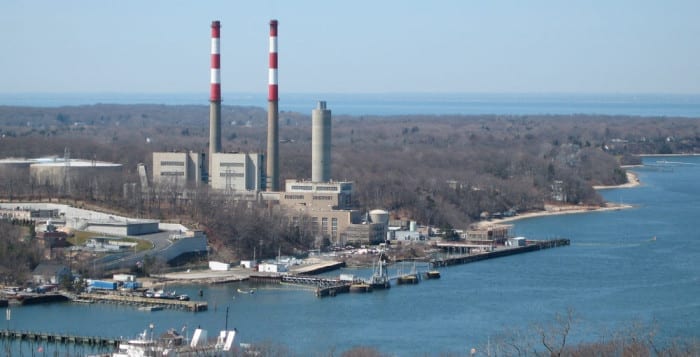PJ Report Says There’s Benefit to Retrofitting Power Plant
LIPA Study Hints at Decommissioning Port Jeff Generating Station

Port Jeff officials are trying to combat potential LIPA plans to decommission the PJ generating station in the next few years, saying there is potential for the site when, or if, renewable energy isn’t enough to meet demands.
With so much attention put to the Long Island Power Authority over PSEG LI’s challenged storm response and upcoming public hearings over the Northport power plant, village officials now have their hands on a report by Robert Foxen, the CEO of Garden City-based engineering consultant Global Common, who was asked to create a study of potential use for the Port Jefferson generating station. The village board approved the study in June at a price not to exceed $7,500.
“If they have to unload 400 megawatts of power, we would prefer that would be somebody else and not Port Jefferson.”
—Margot Garant
In a draft version of his report, Foxen says there are advantages to the power facility on the harbor, including that it already has existing utility hookup for gas and electric and would serve as an “adequate” space for a new hybrid battery without demolishing the existing plant. He also cites in the report the site has strong capacity to switch from liquid fuel to natural gas to reduce costs, and that the site could serve as a host to potentially make Port Jeff electrically independent on its own microgrid, ensuring power for the village in case a shutdown to the main grid.
This comes down the pipe as the village’s purchase power agreement is set to expire in 2027, but because of a provision in the contract, LIPA could give notice and end its agreement as early as 2025.
Port Jeff Mayor Margot Garant was one of the main major players involved with the tax certiorari case about the Port Jeff Power Plant in advocating for the eventual settlement. Now that LIPA has made mention of decommissioning the plant, she argues losing that facility would mean a loss of reliable standard power to supplement the general push toward renewable energy.
She related it to the recent snafu with PSEG’s handling of Tropical Storm Isaias, where major sections of Port Jefferson went without power for days and the utility company was next to impossible to reach.
“It’s interesting we have a lot of plans on paper, but when you get into the everyday of how things are working or not working, it gets complicated,” Garant said. “We still really believe that our fossil fuel plant will benefit everyone in the long run because it will be reliable power. We want them to know that Port Jeff is doing their homework and is looking toward the future, and if they have to unload 400 megawatts of power, we would prefer that would be somebody else and not Port Jefferson.”
The report emphasizes that LIPA seems set to offer a PPA to large-scale battery projects “and will issue a [request for proposal] this fall.” Foxen notes that National Grid is set to propose a 100 megawatt battery for the Port Jeff site and expects to respond for an incoming RFP in late 2020.
National Grid did not respond to a request for comment.
Foxen writes in the report the next step is to create a phase 2 to the current study, and discuss strategy with Jim Flannery, the vice president of National Grid.
LIPA’s Future Plans
New York has set a lofty goal of having 70 percent of all electricity come from renewable sources by 2030 and that the electrical grid will be entirely carbon free by 2040. To that end, two wind power companies have won bids to create 1,700 watts of power from offshore wind farms. One of the two companies, the Denmark-based Orsted, has made previous announcements it plans to base its service and repair crews out of Port Jefferson Harbor. Though the timeline for those to be up and running have started to fall behind, as in April the company said they have experienced delays, some due to the COVID-19 pandemic.
In a May release, LIPA presented a study about closing down a number of its Long Island power plants, including stations such as Glenwood Landing in Nassau, Northport and Port Jeff. It cites new renewable energy has caused a general decrease in need from plants like Port Jeff. The document states it will craft a review by the end of this year on whether to retire “1960s-era steam plants” in Island Park and Port Jefferson as well as recommend an additional decommissioning of 400 to 600 megawatts of steam plants by 2022. Thomas Falcone, the CEO of LIPA, also said reducing the taxes on the plants would lead to “hundreds of millions in tax subsidies for years to come, even if the plants close, averting the immediate, drastic increase in residents’ tax rates that will result from a valuation of the plants reached by a court.”
Perhaps most vague, was the release supporting the idea that redeveloping the Port Jeff and other plants with cleaner technologies was “uneconomical.”
Whether this report was a way of aiding LIPA’s case against the Town of Huntington as it looks to nail down a settlement in that plant’s tax certiorari case, it still hints at what could be a loss for Port Jeff if it truly were to pack up its toys and leave. In a statement, LIPA clarified that “the overassessment of taxes at each of the steam plants, despite their declining energy production, is a significant factor in the early retirement of the plants. Any redevelopment of the sites with cleaner technologies, like storage, would likely be uneconomical because of the current tax assessments. The taxes on these properties are unsustainable for our customers.”

Garant responded to the idea of the plant being uneconomical saying “They have to also look at is having an unreliable power grid, [keeping the plant open] is a drop in the bucket to what the storm just did to us.”
LIPA, in a statement said the after-storm repairs relates “to the transmission and distribution system, not to generating capacity. The storm experience does not affect our plans for achieving a clean power supply.”
The load on power plants often peaks when weather gets extreme, such as the middle of summer and winter, but according to a May report by LIPA, the forecast for peak load has declined steadily over the past year. LIPA has that while four fossil fuel plants built around the 1960s supply just 21 percent of Long Island’s electricity, the plants make up 80 percent of taxes of what customers pay. In December 2018, when LIPA was signing the settlement, it said the Port Jeff plant only ran 11 percent of the year in 2017.
According to a draft edition of the Global Common study, all Long Island plants have seen an annual decrease in the power output of these plants over the past decade, yet Foxen and now the village is arguing that there will be spikes in demand during extreme weather, and plants such as the one in Port Jeff will be needed to carry that extra load. Batteries, Garant argued, will also not be able to store the day’s worth of electricity if the grid is shut down.
Though the Town of Brookhaven and Village of Port Jefferson have settled on a 10-year glidepath for the Port Jefferson generating station, the Town of Huntington has yet to make a final decision on its Northport plant for what would be a seven-year glide path to an overall 50 percent reduction in the plant’s assessment.
LIPA Settlement and Finances
PSEG Long Island customers pay power plant taxes through monthly surcharges on their electric bills, but LIPA owns the electric grid and has agreements with National Grid for the power plants in both Port Jefferson and Northport. In 2009 LIPA challenged both the towns of Brookhaven and Huntington saying it had been overassessed for years, especially since the Port Jeff plant runs for so little time during the year.
For Port Jeff, however, the glidepath reducing the Port Jeff assessment by 50 percent over 10 years has caused additional problems during a year of pandemic. This year’s village budget saw a 3.19 percent decrease from last year’s budget, while residents have been asked to shoulder more thanks to the loss of power plant property taxes. The pandemic has eliminated a good amount of surplus carry over from last year, and village officials voted to put up a bond for multiple projects that were in varying stages of getting done, rather than letting them fall to the wayside.
On the Huntington side of the tax lawsuit, things seem to be coming to a head, though the Town of Huntington has not yet signed any deal and is hosting public forums to gather comments on the proposed 50 percent glide path settlement. Officials have also previously asked LIPA to beg the court to delay any verdict because of the pandemic. LIPA has refused.
Officials from the Town of Brookhaven, which also were part of the Port Jeff plant settlement, declined to comment because Huntington’s case is still being litigated, but Garant said she feels the best way to reduce economic harm to village finances and the community is to keep that power plant property open in some way shape or form.
“That was a major component of what I promised when I ran in 2009 that I would do everything I can to keep our plant open, and now we’re facing that again,” the mayor said. “I think I want to make sure Port Jeff is never not part of that discussion and is ahead of that discussion. Meanwhile everyone else is looking backward.”






